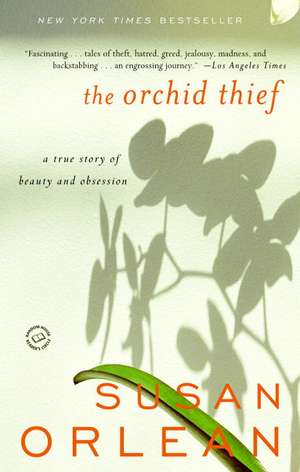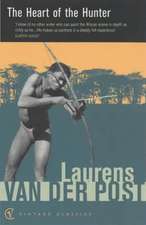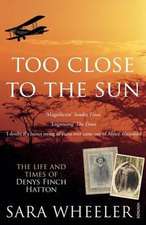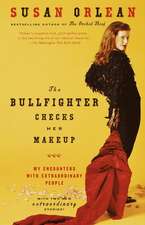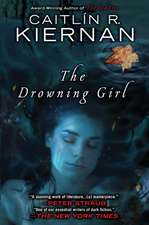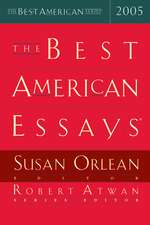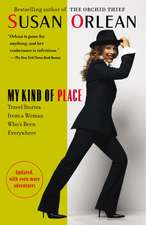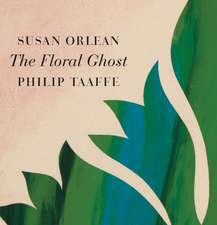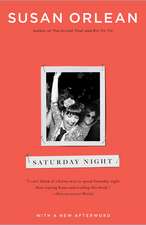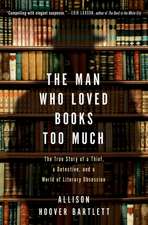The Orchid Thief
Autor Susan Orleanen Limba Engleză Paperback – 31 dec 1999
Vezi toate premiile Carte premiată
A modern classic of personal journalism, The Orchid Thief is Susan Orlean’s wickedly funny, elegant, and captivating tale of an amazing obsession.
From Florida’s swamps to its courtrooms, the New Yorker writer follows one deeply eccentric and oddly attractive man’s possibly criminal pursuit of an endangered flower. Determined to clone the rare ghost orchid, Polyrrhiza lindenii, John Laroche leads Orlean on an unforgettable tour of America’s strange flower-selling subculture, along with the Seminole Indians who help him and the forces of justice who fight him. In the end, Orlean–and the reader–will have more respect for underdog determination and a powerful new definition of passion.
Praise for The Orchid Thief:
“Fascinating . . . tales of theft, hatred, greed, jealousy, madness, and backstabbing . . . an engrossing journey.”
–Los Angeles Times
“Irresistible . . . a brilliantly reported account of an illicit scheme to housebreak Florida’s wild and endangered ghost orchid . . . Its central figure is John Laroche, the ‘oddball ultimate’ of a subculture whose members are so enthralled by orchids they ‘pursue them like lovers.’ ”
–Minneapolis Star Tribune
“Artful . . . in Ms. Orlean’s skillful handling, her orchid story turns out to be distinctly ‘something more.’ . . . [Her] portrait of her sometimes sad-making orchid thief allows the reader to discover acres of opportunity where intriguing things can be found.”
–The New York Times
“Zestful . . . a swashbuckling piece of reporting that celebrates some virtues that made America great.”
–The Wall Street Journal
“Deliciously weird . . . compelling.”
–Detroit Free Press
| Toate formatele și edițiile | Preț | Express |
|---|---|---|
| Paperback (2) | 58.84 lei 24-30 zile | +21.60 lei 4-10 zile |
| Vintage Publishing – 4 mai 2000 | 58.84 lei 24-30 zile | +21.60 lei 4-10 zile |
| BALLANTINE BOOKS – 31 dec 1999 | 103.12 lei 3-5 săpt. |
Preț: 103.12 lei
Nou
Puncte Express: 155
Preț estimativ în valută:
19.74€ • 21.45$ • 16.59£
19.74€ • 21.45$ • 16.59£
Carte disponibilă
Livrare economică 31 martie-14 aprilie
Preluare comenzi: 021 569.72.76
Specificații
ISBN-13: 9780449003718
ISBN-10: 044900371X
Pagini: 320
Dimensiuni: 139 x 207 x 18 mm
Greutate: 0.29 kg
Editura: BALLANTINE BOOKS
Locul publicării:New York, NY
ISBN-10: 044900371X
Pagini: 320
Dimensiuni: 139 x 207 x 18 mm
Greutate: 0.29 kg
Editura: BALLANTINE BOOKS
Locul publicării:New York, NY
Recenzii
"Like the orchid, a small thing of grandeur, a passion with a pedigree . . . The Orchid Thief shows [Orlean's] gifts in full bloom."
--The New York Times Book Review
"A LESSON IN THE DARK, DANGEROUS, SOMETIMES HILARIOUS NATURE OF OBSESSION . . . YOU SOMETIMES DON'T WANT TO READ ON, BUT FIND YOU CAN'T HELP IT."
--USA Today
"IRRESISTIBLE . . . A brilliantly reported account of an illicit scheme to housebreak Florida's wild and endangered ghost orchid. Its central figure is John Laroche, the 'oddball ultimate' of a subculture whose members are so enthralled by orchids they 'pursue them like lovers.' "
--Minneapolis Star Tribune
"FASCINATING . . . TALES OF THEFT, HATRED, GREED, JEALOUSY, MADNESS, AND BACK-STABBING . . . AN ENGROSSING JOURNEY."
--Los Angeles Times
"ARTFUL . . . In Ms. Orlean's skillful handling, her orchid story turns out to be distinctly 'something more.' . . . Orchids, Seminole history, the ecology of the Fakahatchee Strand, the fascination of Florida to con men. . . . All that she writes here fits together because it is grounded in her personal experience. . . . [Her] portrait of her sometimes sad-making orchid thief allows the reader to discover acres of opportunity where intriguing things can be found."
--Christopher Lehmann-Haupt
The New York Times
"DELICIOUSLY WEIRD . . . COMPELLING."
--Detroit Free Press
"ZESTFUL . . . A swashbuckling piece of reporting that celebrates some virtues that made America great. Here are visionary passions and fierce obsessions; heroic feats accomplished in exotic settings; outsize characters, entrepreneurs at the edge of the frontier, adventurers. . . . Orlean, an intrepid sociologist among the orchid fanatics, is also a poetic observer."
--The Wall Street Journal
--The New York Times Book Review
"A LESSON IN THE DARK, DANGEROUS, SOMETIMES HILARIOUS NATURE OF OBSESSION . . . YOU SOMETIMES DON'T WANT TO READ ON, BUT FIND YOU CAN'T HELP IT."
--USA Today
"IRRESISTIBLE . . . A brilliantly reported account of an illicit scheme to housebreak Florida's wild and endangered ghost orchid. Its central figure is John Laroche, the 'oddball ultimate' of a subculture whose members are so enthralled by orchids they 'pursue them like lovers.' "
--Minneapolis Star Tribune
"FASCINATING . . . TALES OF THEFT, HATRED, GREED, JEALOUSY, MADNESS, AND BACK-STABBING . . . AN ENGROSSING JOURNEY."
--Los Angeles Times
"ARTFUL . . . In Ms. Orlean's skillful handling, her orchid story turns out to be distinctly 'something more.' . . . Orchids, Seminole history, the ecology of the Fakahatchee Strand, the fascination of Florida to con men. . . . All that she writes here fits together because it is grounded in her personal experience. . . . [Her] portrait of her sometimes sad-making orchid thief allows the reader to discover acres of opportunity where intriguing things can be found."
--Christopher Lehmann-Haupt
The New York Times
"DELICIOUSLY WEIRD . . . COMPELLING."
--Detroit Free Press
"ZESTFUL . . . A swashbuckling piece of reporting that celebrates some virtues that made America great. Here are visionary passions and fierce obsessions; heroic feats accomplished in exotic settings; outsize characters, entrepreneurs at the edge of the frontier, adventurers. . . . Orlean, an intrepid sociologist among the orchid fanatics, is also a poetic observer."
--The Wall Street Journal
Notă biografică
Susan Orlean has been a staff writer at The New Yorker since 1992. Her articles have also appeared in Outside, Rolling Stone, Vogue, and Esquire. She is the author of Saturday Night, a New York Times Notable Book of 1990, which, in the words of Entertainment Weekly, "calls to mind Damon Runyon, Evelyn Waugh, and screwball comedy." She lives in New York City.
Extras
The Millionaire's Hothouse
John Laroche is a tall guy, skinny as a stick, pale-eyed, slouch-shouldered, and sharply handsome, in spite of the fact that he is missing all his front teeth. He has the posture of al dente spaghetti and the nervous intensity of someone who plays a lot of video games. Laroche is thirty-six years old. Until recently he was employed by the Seminole Tribe of Florida, setting up a plant nursery and an orchid-propagation laboratory on the tribe's reservation in Hollywood, Florida.
Laroche strikes many people as eccentric. The Seminoles, for instance, have two nicknames for him: Troublemaker and Crazy White Man. Once, when Laroche was telling me about his childhood, he remarked, "Boy, I sure was a weird little kid." For as long as he can remember he has been exceptionally passionate and driven. When he was about nine or ten, his parents said he could pick out a pet. He decided to get a little turtle. Then he asked for ten more little turtles. Then he decided he wanted to breed the turtles, and then he started selling turtles to other kids, and then he could think of nothing but turtles and then decided that his life wasn't worth living unless he could collect one of every single turtle species known to mankind, including one of those sofa-sized tortoises from the Galapagos. Then, out of the blue, he fell out of love with turtles and fell madly in love with Ice Age fossils. He collected them, sold them, declared that he lived for them, then abandoned them for something else--lapidary I think--then he abandoned lapidary and became obsessed with collecting and resilvering old mirrors. Laroche's passions arrived unannounced and ended explosively, like car bombs. When I first met him he lusted only for orchids, especially the wild orchids growing in Florida's Fakahatchee Strand. I spent most of the next two years hanging around with him, and at the end of those two years he had gotten rid of every single orchid he owned and swore that he would never own another orchid for as long as he lived. He is usually true to his word. Years ago, between his Ice Age fossils and his old mirrors, he went through a tropical-fish phase. At its peak, he had more than sixty fish tanks in his house and went skin-diving regularly to collect fish. Then the end came. He didn't gradually lose interest: he renounced fish and vowed he would never again collect them and, for that matter, he would never set foot in the ocean again. That was seventeen years ago. He has lived his whole life only a couple of feet west of the Atlantic, but he has not dipped a toe in it since then.
Laroche tends to sound like a Mr. Encyclopedia, but he did not have a rigorous formal education. He went to public school in North Miami; other than that, he is self-taught. Once in a while he gets wistful about the life he thinks he would have led if he had applied himself more conventionally. He believes he would have probably become a brain surgeon and that he would have made major brain-research breakthroughs and become rich and famous. Instead, he lives in a frayed Florida bungalow with his father and has always scratched out a living in unaverage ways. One of his greatest assets is optimism--that is, he sees a profitable outcome in practically every life situation, including disastrous ones. Years ago he spilled toxic pesticide into a cut on his hand and suffered permanent heart and liver damage from it. In his opinion, it was all for the best because he was able to sell an article about the experience ("Would You Die for Your Plants?") to a gardening journal. When I first met him, he was working on a guide to growing plants at home. He told me he was going to advertise it in High Times, the marijuana magazine. He said the ad wouldn't mention that marijuana plants grown according to his guide would never mature and therefore never be psychoactive. The guide was one of his all-time favorite projects. The way he saw it, he was going to make lots of money on it (always excellent) plus he would be encouraging kids to grow plants (very righteous) plus the missing information in the guide would keep these kids from getting stoned because the plants they would grow would be impotent (incalculably noble). This last fact was the aspect of the project he was proudest of, because he believed that once kids who bought the guide realized they'd wasted their money trying to do something illegal--namely, grow and smoke pot--they would also realize, thanks to John Laroche, that crime doesn't pay. Schemes like these, folding virtue and criminality around profit, are Laroche's specialty. Just when you have finally concluded that he is a run-of-the-mill crook, he unveils an ulterior and somewhat principled but always lucrative reason for his crookedness. He likes to describe himself as a shrewd bastard. He loves doing things the hard way, especially if it means that he gets to do what he wants to do but also gets to leave everyone else wondering how he managed to get away with it. He is quite an unusual person. He is also the most moral amoral person I've ever known.
I met John Laroche for the first time a few years ago, at the Collier County Courthouse in Naples, Florida. I was in Florida at the time because I had read a newspaper article reporting that a white man--Laroche--and three Seminole men had been arrested with rare orchids they had stolen out of a Florida swamp called the Fakahatchee Strand State Preserve, and I wanted to know more about the incident. The newspaper story was short but alluring. It described the Fakahatchee as a wild swamp near Naples filled with exceptional plants and trees, including some that don't grow anywhere else in the United States and some that grow nowhere else in the world. All wild orchids are now considered endangered, and it is illegal to take them out of the woods anywhere, and particularly out of a state property like the Fakahatchee. According to the newspaper, Laroche was the ringleader of the poachers. He provided the arresting officers with the proper botanical varietal names for all the stolen plants and explained that the plants were bound for a laboratory where they were going to be cloned by the millions and then sold to orchid collectors around the world.
I read lots of local newspapers and particularly the shortest articles in them, and most particularly any articles that are full of words in combinations that are arresting. In the case of the orchid story I was interested to see the words "swamp" and "orchids" and "Seminoles" and "cloning" and "criminal" together in one short piece. Sometimes this kind of story turns out to be something more, some glimpse of life that expands like those Japanese paper balls you drop in water and then after a moment they bloom into flowers, and the flower is so marvelous that you can't believe there was a time when all you saw in front of you was a paper ball and a glass of water. The judge in the Seminole orchid case had scheduled a hearing a few weeks after I read the article, so I arranged to go down to Naples to see if this ball of paper might bloom.
It was the dead center of winter when I left New York; in Naples it was warm and gummy, and from my plane I could see thick thunderclouds trolling along the edge of the sky. I checked into a big hotel on the beach, and that evening I stood on my balcony and watched the storm explode over the water. The hearing was the next morning at nine. As I pulled out of the hotel garage the parking attendant warned me to drive carefully. "See, in Naples you got to be careful," he said, leaning in my window. He smelled like daiquiris. It was probably suntan lotion. "When it rains here," he added, "cars start to fly." There are more golf courses per person in Naples than anywhere else in the world, and in spite of the hot, angry weather everyone around the hotel was dressed to play, their cleated shoes tapping out a clickety-clickety-clickety tattoo on the sidewalks.
The courthouse was a few miles south of town in a fresh-looking building made of bleached stone pocked with fossilized seashells. When I arrived, there were a few people inside, nobody talking to anybody, no sounds except for the creaking of the wooden benches and the sound of some guy in the front row gunning his throat. After a moment I recognized Laroche from the newspaper picture I'd seen. He was not especially dressed up for court. He was wearing wraparound Mylar sunglasses, a polyblend shirt printed with some sort of scenic design, a Miami Hurricanes baseball cap, and worn-out grayish trousers that sagged around his rear. He looked as if he wanted a cigarette. He was starting to stand up when the judge came in and settled in her chair; he sat down and looked cross. The prosecutor then rose and read the state's charges--that on December 21, 1994, Laroche and his three Seminole assistants had illegally removed more than two hundred rare orchid and bromeliad plants from the Fakahatchee and were apprehended leaving the swamp in possession of four cotton pillowcases full of flowers. They were accused of criminal possession of endangered species and of illegally removing plant life from state property, both of which are punishable by jail time and fines.
The judge listened with a blank expression, and when the prosecutor finished she called Laroche to testify. He made a racket getting up from his seat and then sauntered to the center of the courtroom with his head cocked toward the judge and his thumbs hooked in his belt loops. The judge squinted at him and told him to state his name and address and to describe his expertise with plants. Laroche jiggled his foot and shrugged. "Well, Your Honor," he said, "I'm a horticultural consultant. I've been a professional horticulturist for approximately twelve years and I've owned a plant nursery with a number of plants of great commercial and ethnobiological value. I have very extensive experience with orchids and with the asexual micropropagation of orchids under aseptic cultures." He paused for a moment and grinned. Then he glanced around the room and added, "Frankly, Your Honor, I'm probably the smartest person I know."
John Laroche is a tall guy, skinny as a stick, pale-eyed, slouch-shouldered, and sharply handsome, in spite of the fact that he is missing all his front teeth. He has the posture of al dente spaghetti and the nervous intensity of someone who plays a lot of video games. Laroche is thirty-six years old. Until recently he was employed by the Seminole Tribe of Florida, setting up a plant nursery and an orchid-propagation laboratory on the tribe's reservation in Hollywood, Florida.
Laroche strikes many people as eccentric. The Seminoles, for instance, have two nicknames for him: Troublemaker and Crazy White Man. Once, when Laroche was telling me about his childhood, he remarked, "Boy, I sure was a weird little kid." For as long as he can remember he has been exceptionally passionate and driven. When he was about nine or ten, his parents said he could pick out a pet. He decided to get a little turtle. Then he asked for ten more little turtles. Then he decided he wanted to breed the turtles, and then he started selling turtles to other kids, and then he could think of nothing but turtles and then decided that his life wasn't worth living unless he could collect one of every single turtle species known to mankind, including one of those sofa-sized tortoises from the Galapagos. Then, out of the blue, he fell out of love with turtles and fell madly in love with Ice Age fossils. He collected them, sold them, declared that he lived for them, then abandoned them for something else--lapidary I think--then he abandoned lapidary and became obsessed with collecting and resilvering old mirrors. Laroche's passions arrived unannounced and ended explosively, like car bombs. When I first met him he lusted only for orchids, especially the wild orchids growing in Florida's Fakahatchee Strand. I spent most of the next two years hanging around with him, and at the end of those two years he had gotten rid of every single orchid he owned and swore that he would never own another orchid for as long as he lived. He is usually true to his word. Years ago, between his Ice Age fossils and his old mirrors, he went through a tropical-fish phase. At its peak, he had more than sixty fish tanks in his house and went skin-diving regularly to collect fish. Then the end came. He didn't gradually lose interest: he renounced fish and vowed he would never again collect them and, for that matter, he would never set foot in the ocean again. That was seventeen years ago. He has lived his whole life only a couple of feet west of the Atlantic, but he has not dipped a toe in it since then.
Laroche tends to sound like a Mr. Encyclopedia, but he did not have a rigorous formal education. He went to public school in North Miami; other than that, he is self-taught. Once in a while he gets wistful about the life he thinks he would have led if he had applied himself more conventionally. He believes he would have probably become a brain surgeon and that he would have made major brain-research breakthroughs and become rich and famous. Instead, he lives in a frayed Florida bungalow with his father and has always scratched out a living in unaverage ways. One of his greatest assets is optimism--that is, he sees a profitable outcome in practically every life situation, including disastrous ones. Years ago he spilled toxic pesticide into a cut on his hand and suffered permanent heart and liver damage from it. In his opinion, it was all for the best because he was able to sell an article about the experience ("Would You Die for Your Plants?") to a gardening journal. When I first met him, he was working on a guide to growing plants at home. He told me he was going to advertise it in High Times, the marijuana magazine. He said the ad wouldn't mention that marijuana plants grown according to his guide would never mature and therefore never be psychoactive. The guide was one of his all-time favorite projects. The way he saw it, he was going to make lots of money on it (always excellent) plus he would be encouraging kids to grow plants (very righteous) plus the missing information in the guide would keep these kids from getting stoned because the plants they would grow would be impotent (incalculably noble). This last fact was the aspect of the project he was proudest of, because he believed that once kids who bought the guide realized they'd wasted their money trying to do something illegal--namely, grow and smoke pot--they would also realize, thanks to John Laroche, that crime doesn't pay. Schemes like these, folding virtue and criminality around profit, are Laroche's specialty. Just when you have finally concluded that he is a run-of-the-mill crook, he unveils an ulterior and somewhat principled but always lucrative reason for his crookedness. He likes to describe himself as a shrewd bastard. He loves doing things the hard way, especially if it means that he gets to do what he wants to do but also gets to leave everyone else wondering how he managed to get away with it. He is quite an unusual person. He is also the most moral amoral person I've ever known.
I met John Laroche for the first time a few years ago, at the Collier County Courthouse in Naples, Florida. I was in Florida at the time because I had read a newspaper article reporting that a white man--Laroche--and three Seminole men had been arrested with rare orchids they had stolen out of a Florida swamp called the Fakahatchee Strand State Preserve, and I wanted to know more about the incident. The newspaper story was short but alluring. It described the Fakahatchee as a wild swamp near Naples filled with exceptional plants and trees, including some that don't grow anywhere else in the United States and some that grow nowhere else in the world. All wild orchids are now considered endangered, and it is illegal to take them out of the woods anywhere, and particularly out of a state property like the Fakahatchee. According to the newspaper, Laroche was the ringleader of the poachers. He provided the arresting officers with the proper botanical varietal names for all the stolen plants and explained that the plants were bound for a laboratory where they were going to be cloned by the millions and then sold to orchid collectors around the world.
I read lots of local newspapers and particularly the shortest articles in them, and most particularly any articles that are full of words in combinations that are arresting. In the case of the orchid story I was interested to see the words "swamp" and "orchids" and "Seminoles" and "cloning" and "criminal" together in one short piece. Sometimes this kind of story turns out to be something more, some glimpse of life that expands like those Japanese paper balls you drop in water and then after a moment they bloom into flowers, and the flower is so marvelous that you can't believe there was a time when all you saw in front of you was a paper ball and a glass of water. The judge in the Seminole orchid case had scheduled a hearing a few weeks after I read the article, so I arranged to go down to Naples to see if this ball of paper might bloom.
It was the dead center of winter when I left New York; in Naples it was warm and gummy, and from my plane I could see thick thunderclouds trolling along the edge of the sky. I checked into a big hotel on the beach, and that evening I stood on my balcony and watched the storm explode over the water. The hearing was the next morning at nine. As I pulled out of the hotel garage the parking attendant warned me to drive carefully. "See, in Naples you got to be careful," he said, leaning in my window. He smelled like daiquiris. It was probably suntan lotion. "When it rains here," he added, "cars start to fly." There are more golf courses per person in Naples than anywhere else in the world, and in spite of the hot, angry weather everyone around the hotel was dressed to play, their cleated shoes tapping out a clickety-clickety-clickety tattoo on the sidewalks.
The courthouse was a few miles south of town in a fresh-looking building made of bleached stone pocked with fossilized seashells. When I arrived, there were a few people inside, nobody talking to anybody, no sounds except for the creaking of the wooden benches and the sound of some guy in the front row gunning his throat. After a moment I recognized Laroche from the newspaper picture I'd seen. He was not especially dressed up for court. He was wearing wraparound Mylar sunglasses, a polyblend shirt printed with some sort of scenic design, a Miami Hurricanes baseball cap, and worn-out grayish trousers that sagged around his rear. He looked as if he wanted a cigarette. He was starting to stand up when the judge came in and settled in her chair; he sat down and looked cross. The prosecutor then rose and read the state's charges--that on December 21, 1994, Laroche and his three Seminole assistants had illegally removed more than two hundred rare orchid and bromeliad plants from the Fakahatchee and were apprehended leaving the swamp in possession of four cotton pillowcases full of flowers. They were accused of criminal possession of endangered species and of illegally removing plant life from state property, both of which are punishable by jail time and fines.
The judge listened with a blank expression, and when the prosecutor finished she called Laroche to testify. He made a racket getting up from his seat and then sauntered to the center of the courtroom with his head cocked toward the judge and his thumbs hooked in his belt loops. The judge squinted at him and told him to state his name and address and to describe his expertise with plants. Laroche jiggled his foot and shrugged. "Well, Your Honor," he said, "I'm a horticultural consultant. I've been a professional horticulturist for approximately twelve years and I've owned a plant nursery with a number of plants of great commercial and ethnobiological value. I have very extensive experience with orchids and with the asexual micropropagation of orchids under aseptic cultures." He paused for a moment and grinned. Then he glanced around the room and added, "Frankly, Your Honor, I'm probably the smartest person I know."
Descriere
The orchid thief is John Laroche, a renegade plant dealer and sharply handsome guy in spite of the fact that he is missing all his teeth and has the posture of al dente spaghetti. This national bestseller follows him into the Florida swamp to relate his mesmerizing true story of beauty and obsession.
Premii
- Book Sense Book of the Year Award Nominee, 2001
